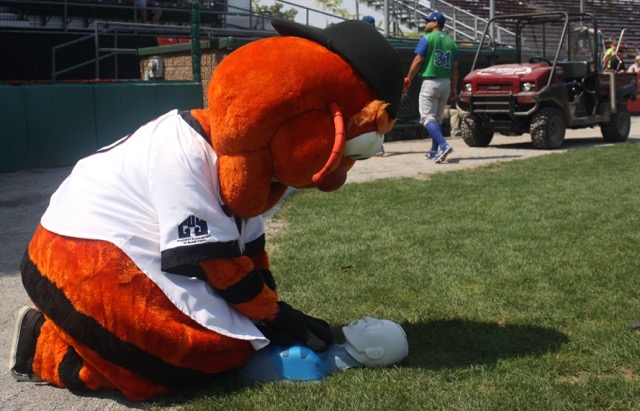HAGERSTOWN, Md. – Pitches weren’t the only thing being thrown hard and fast Sunday at the Hagerstown Suns stadium. Dedicated career and volunteer staff with Community Rescue Service were on hand before the game demonstrating the American Heart Association’s new, hard and fast, Hands-Only CPR.
“We want to get the educational component out there, so that people aren’t afraid to do CPR…cardiopulmonary resuscitation or CPR, especially performed immediately can double or triple a patients chances of survival,” Lt. Kara Kile of Community Rescue Service said.
Ashley Bowling, a spokeswoman for the Hagerstown Suns said it is a responsibility of the Hagerstown Suns to be an outlet for organizations to create more awareness of important topics, such as Hands-Only CPR.
This is where Community Rescue Service can help.
“We have the knowledge, resources, and ability to speak to and educate our community on the benefits of hands-only CPR, before a cardiac arrest victim is encountered in our community,” Community Rescue Service, Assistant Chief R. David Hays said.
Kile, also an American Heart Association CPR instructor said 420,000 out-of-hospital cardiac arrests were reported in 2014. Four out of every five cardiac arrest happen at home and 90 percent of people who suffer sudden, out-of-hospital cardiac arrest will die.
“Cardiac arrest is an electrical malfunction in the heart that causes an irregular heart beat that disrupts the flow of blood to the brain, lungs and other vitals orangs,” Kile said. “This is the leading cause of death.”
Hands-Only CPR is only a two-step process, 1. Call 911 and 2. Push hard and fast at the center of the chest, according to Kile.
The American Heart Association reports, any attempt at CPR is better than no attempt. Hands-Only CPR performed by a bystander has been shown to be as effective as conventional CPR with mouth-to-mouth breaths in the first few minutes of an out-of-hospital sudden cardiac arrest.
“We also now know that chest compressions (provided) to a cardiac arrest victim creates enough negative pressure within the chest during recoil to create sufficient air exchange into and out of the lungs,” Hays said.
“Most people don’t know how to react either because they don’t know CPR or they are afraid of hurting the victim,” Kile said. “We are here to provide them with the knowledge and demonstrate how to perform a potentially life-saving technique with no mouth-to-mouth contact.”
“As a bystander, don’t be afraid, to help,” Kile emphasized.
“I hope the fans, both parents and children will take away a better understanding of the importance of CPR,” Bowling said. “I hope fans also take away a sense of responsibility to their community and fellow citizens. It is our responsibility not only to entertain our fans but also educate them on issues such as these to create a better environment for our community.
Kile added that the AHA continues to recommend conventional CPR with chest compressions and mouth-to-mouth breathing in situations involving infants and children, victims of drowning, drug overdose or people who collapse due to a breathing problem.
“Lt. Kile and Technician Sydney Hays brought the idea of CPR in our community to me in early 2015, Lt. Kile is the project coordinator and has worked tirelessly to bring this idea to fruition on behalf of CRS,” Hays said.
Hays said that in recent years, emergency medical service agencies have undertaken a more active role in injury prevention through their communities with events such as this.
“CRS has joined this effort and embraces the additional opportunity to help save lives,” Hays said.
Community Rescue Service also provided an ambulance and crew for tours and to answer questions at Sunday’s event.
Todd Bowman is a staff writer for The Picket. He can be reached at tbowma04@rams.shepherd.edu or on Twitter @todd_bowman87.
